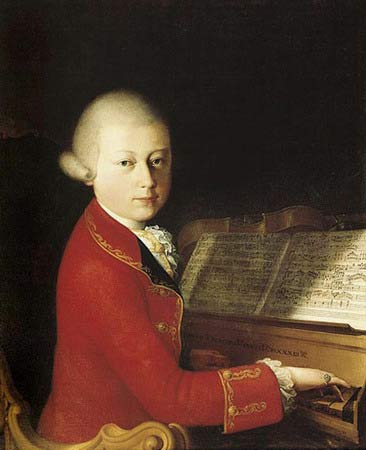 Wolfgang Amadeus Mozart (aged 14) by Saverio dalla Rosa is seen in this handout photograph released in London November 30, 2009. (Agencies)
|
Click for photo of early blood transfusion
|
A gruesome account of a 1666 blood transfusion and amusing notes about how an 8-year-old Mozart responded to tests of his genius were published on Monday as part of an online history of scientific endeavor. The "Trailblazing" website was created by Britain's influential science academy the Royal Society, and includes handwritten papers on some of the most important scientific discoveries of the past three and a half centuries. Benjamin Franklin's studies on flying a kite in an electrical storm from 1752 show the first time anyone had proposed that lightning is electricity and not a supernatural force. And Edward Stone's 1763 notes on the success of willow bark in treating fever document the beginnings of the discovery of salicylic acid and the production of aspirin - now one of the world's most used medicines. The creators of Trailblazing say it is a "go-at-your-own-pace" virtual journey through science which the Royal Society hopes will inspire members of the public to see science as part of everyday life and culture. Martin Rees, president of the Royal Society, said the papers showed "a ceaseless quest by scientists over the centuries...to test and build on our knowledge of humankind and the universe." "They represent those thrilling moments when science allows us to understand better and to see further," he added. The papers, taken from past issues of the oldest scientific journal in the English-speaking world, Philosophical Transactions, also include documents from 1776 on how Captain James Cook saved his sailors from scurvy with pickled cabbage, lemons and malt - long before ideas about nutrition developed. They also include Stephen Hawking's early writing on black holes and Isaac Newton's 1672 landmark work on the nature of light and color and 1940 papers on the discovery of penicillin. Daines Barrington, a skeptical scientist who wanted to test the claim that Mozart was a genius when he visited London in 1770 at the age of eight, notes the musician was as distracted and playful as any normal boy, but showed remarkable talent. "The score was no sooner put upon his desk, than he began to play the symphony in a most masterly manner," he wrote. To see the website, go to trailblazing.royalsociety.org (Read by Guanny Liu. Guanny Liu is a multimedia journalist at the China Daily Web site.) 点击查看更多双语新闻
|
本周一,一家网站公布了一些重大科学发现的历史文献资料,其中包括一篇记述1666年一次可怕的早期输血经历的文章,以及有关八岁的莫扎特接受音乐才能测试的有趣记载。 “开拓”网站由英国颇具影响力的科研机构皇家学会创办,该网站公布了过去350年间一些重大科学发现的研究手稿。 这其中包括1752年本杰明•富兰克林在雷电中放风筝的相关研究报告,该研究首次证明闪电是电力,而非某种超自然力。 “开拓”网站还公布了爱德华•斯通1763年有关白柳树皮可用来退烧的记录,这是发现水杨酸,并研制出当今最常用的药物阿司匹林的开端。 “开拓”网站的创建者表示,这是一次可以“按照你自己的脚步”进行的虚拟科学之旅。英国皇家学会希望通过此举可激发公众(对于科学的兴趣),将其视为日常生活和文化的一部分。 皇家学会主席马丁•里斯称,这些手稿展示了“科学家们数百年来的不懈探索,通过不断尝试建立有关人类和宇宙的知识体系。” 他说:“这些文稿记载了那些激动人心的时刻,科学,才是让我们更好、更深入认识世界的方法。” 这些论文文稿均摘自最古老的英文科学期刊《哲学学报》的过刊。同时被公布上网的还包括1776年詹姆斯•库克船长如何用腌制甘蓝菜、柠檬和麦芽治愈船员坏血病的记载,这比营养学理论的建立早很多年。 此外,网站还公布了斯蒂芬•霍金有关黑洞理论的早期著述、艾萨克•牛顿1672年有关光学色彩原理的里程碑意义的论著以及1940年发现青霉素的论著。 网站还刊发了验证莫扎特是否是音乐神童的趣事。1770年,科学家戴恩斯•巴林顿在当时年仅八岁的莫扎特访问伦敦期间特地对他进行了测试,证实了莫扎特的音乐才能。根据他的记载,当时的莫扎特和一般的男孩一样,爱玩容易分心,但拥有惊人的音乐天赋。 他写道:“乐谱一摆上架,他就开始极其娴熟地演奏起交响曲了。” 更多内容可登陆trailblazing.royalsociety.org网站上查看。 相关阅读 (中国日报网英语点津 Julie 编辑蔡姗姗) |
|
Vocabulary: gruesome:causing great horror; horribly repugnant; grisly(可怕的) blood transfusion:输血 trailblazing: being a pioneer in (a particular subject, technique, etc.)(领导性的,带头的) scurvy:坏血病 score:a written or printed piece of music with all the vocal and instrumental parts arranged on staves, one under the other(乐谱) |